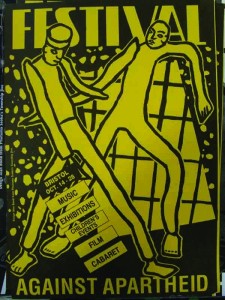Risky Histories
Writing the history of activism is a risky business, not least when activists themselves are at the forefront of constructing their own historical legacy, recording their experiences not for the sake nostalgia, but through a passionate desire to ensure that their past is not only remembered, but forms part of a living story. The Anti-Apartheid Movement has been a remarkable guardian of its own history, creating an Archives Committee at the very moment it brought an end to its campaign in 1994, an archive that has become one of the largest collections held by the Bodleian Library of Commonwealth History at Oxford.

Last week, the AAM launched a Lottery Funded website, providing access to a large range of material from their own archive, together with material from institutions including the Bishopsgate institute, the Museum of London and Glasgow Caledonian University. The website is a real treasure trove for the anti-apartheid historian (and indeed anyone with an interest in political activism more generally). Included in its myriad collections of images are a poster for the last ever Smiths gig in 1986, and material relating to the St. Paul’s Apartheid Free Zone in Bristol.
But this is risky history, nevertheless. Between the lines, some might discern traces of old disputes and conflicts, although to me these seem to be the unsurprising scars left by experiences shaped by deep political convictions and frustrations rather than a cause for continued tension. Speaking personally, though, the risk comes not from any memories of battles once fought, but the way this work challenges the norms of academic historical research. There is a necessary acceptance of shared authorship, a constant need to be mindful of the presence of the activists themselves in everything that I write. But I believe that is a risk worth living with – particularly when, as academics, we are given the privilege of supporting the co-production of the history of one of the most important social movements of the twentieth century. The Forward to Freedom website is a marvellous resource, and if we in Bristol can inspire former local activists to produce something even close, then the project will have been worthwhile.
The ‘Know Your Bristol – On the Move’ team will be in attendance at the upcoming Action for Southern Africa (Bristol) Annual General Meeting on 30th April. Do come along to find out more about our project. Further details to follow.